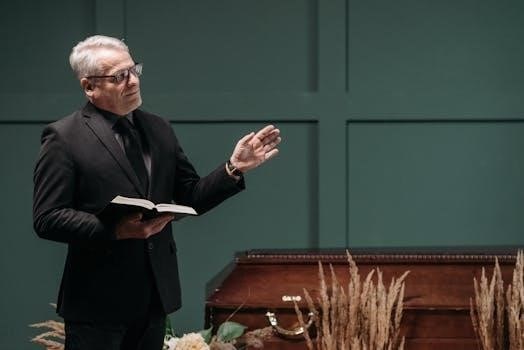
-
By:
- elizabeth
- No comment
powerful funeral sermons pdf
The Significance of Funeral Sermons
Funeral sermons hold profound significance, offering solace and meaning during times of loss. They serve to acknowledge grief, celebrate the deceased’s life, and provide spiritual comfort. These sermons can guide mourners toward healing and hope. They can also affirm faith in the face of death.
The Role of the Funeral Sermon in Mourning
The funeral sermon plays a crucial role in the mourning process, offering a space for emotional expression and acknowledging the reality of loss. It provides comfort by reminding attendees of God’s presence and love during difficult times. A well-delivered sermon can help to validate the feelings of grief, allowing mourners to find strength in their faith and begin the journey toward healing. It serves as a reminder of the support available through community and shared beliefs during moments of sorrow.
Meeting the Needs of the Living
Funeral sermons primarily address the needs of the living, offering social, psychological, and spiritual support during times of grief. They provide a space for collective mourning, allowing individuals to process their emotions within a supportive community. The sermon aims to fulfill the emotional needs of those present, acknowledging their feelings rather than denying them. By focusing on hope and remembrance, it helps attendees find meaning and strength to navigate their sorrow and begin the healing process. It also reminds them of life’s brevity.

Key Elements of a Powerful Funeral Sermon
A powerful funeral sermon incorporates comfort and perspective, offering solace during grief. It includes a heartfelt tribute to the deceased, honoring their life and legacy. It focuses on hope and resurrection, providing spiritual reassurance. It also helps acknowledge the family’s loss.
Comfort and Perspective
Providing comfort involves acknowledging the pain and grief of those present. It’s about offering reassurance and validation of their emotions, reminding them that it’s okay to mourn. Perspective comes from placing death within a spiritual context, offering a broader understanding of life’s journey and the promise of eternal life. It is achieved through sharing scripture and reflections on faith. It helps shift the focus beyond immediate sorrow.
Tribute to the Deceased
A tribute to the deceased is a vital part of a funeral sermon. It involves honoring their life, achievements, and the impact they had on others. Sharing specific memories, anecdotes, and qualities that defined them helps create a personal and meaningful remembrance. This segment offers a chance to celebrate their unique contributions. It is important to acknowledge their relationships and the love they shared with family and friends. This celebration of their life provides comfort to those grieving.
Focus on Hope and Resurrection
A crucial element of a powerful funeral sermon is the focus on hope and resurrection. This involves emphasizing the belief in eternal life and the promise of reunion. The sermon should offer comfort through scripture, highlighting God’s love and the victory over death. It can also address the Christian perspective on death as a transition to a better place. By focusing on hope, the sermon provides strength to face grief and encourages faith in God’s promises. It is a reminder of the eternal joy awaiting believers.

Sermon Styles and Approaches
Funeral sermons can vary in style, including topical, textual, and expository approaches. Adapting the sermon to the audience is essential. Regardless of the style, grounding the message in God’s Word is of utmost importance for providing comfort and guidance.
Topical, Textual, and Expository Sermons
Topical sermons address specific themes related to death, grief, and hope. Textual sermons focus on a particular Bible verse, drawing out its meaning for the occasion. Expository sermons systematically explain a passage of Scripture. The chosen style should align with the speaker’s strengths and the needs of the bereaved. Each approach offers a unique way to convey comfort and perspective. Selecting the right style can greatly enhance the sermon’s impact. Consideration and prayer will help.
Adapting the Sermon to the Audience
Adapting the funeral sermon to the audience is crucial for its effectiveness. Consider the faith backgrounds, cultural sensitivities, and emotional states of those present. A diverse audience may require a message that resonates with various beliefs. Speak in a way that is both comforting and accessible. Avoid jargon or overly complex theological concepts. Tailoring the sermon ensures that it meets the specific needs of the mourners. Thoughtful preparation is necessary for a message that truly connects. Sensitivity and empathy are key elements.
The Importance of God’s Word
The foundation of a powerful funeral sermon rests upon God’s Word. Scripture provides comfort, hope, and eternal perspective during times of grief. Select passages that speak to loss, resurrection, and God’s unwavering love. The Bible offers assurance of salvation and eternal life. Sharing relevant verses can bring peace to those who mourn. Grounding the sermon in scripture provides a solid foundation of truth. It reminds the audience of God’s promises. The scriptures offer a path to healing and strength through faith. It is a source of lasting comfort.
Resources for Funeral Sermons
Various resources can aid in crafting impactful funeral sermons. These include collections of sermons in PDF format, online outlines, and scripture guides. Such resources offer inspiration and structure. They provide valuable support to ministers preparing these important messages.
Collections of Funeral Sermons in PDF Format
Numerous collections of funeral sermons are available in PDF format, offering convenient access to diverse messages. These collections often include sermons for various situations, such as the loss of a child, non-Christian funerals, and general memorial services. They can serve as valuable resources for pastors seeking inspiration and guidance. These readily accessible documents can assist in preparing thoughtful and comforting eulogies. They provide a range of styles and approaches to meet the unique needs of grieving communities, facilitating meaningful tributes and messages of hope.
Online Sermon Outlines and Guides
Online sermon outlines and guides offer a structured approach to crafting meaningful funeral messages. These resources often include suggested scriptures, key themes, and points for reflection. They provide a framework for pastors to personalize sermons and address the specific circumstances of each loss. These guides assist in organizing thoughts, ensuring a coherent and impactful message. Many websites provide free sermon outlines covering various topics relevant to funeral services. This helps clergy to provide comfort, hope, and spiritual guidance to grieving families and congregations during difficult times.
Utilizing Scripture for Comfort and Hope
Scripture provides a foundation of comfort and hope in funeral sermons, offering solace through timeless truths. Verses addressing grief, loss, and eternal life can reassure mourners of God’s presence and promises. Passages about resurrection, such as John 11⁚25-26, offer hope in the face of death. Psalms like Psalm 23 can offer comfort in the midst of sorrow. Utilizing scripture effectively can provide a sense of peace and strengthen faith during the grieving process. Choosing appropriate verses and reflecting on their meaning is key to a powerful sermon.

Considerations for Non-Christian Funerals
Non-Christian funerals require a different approach, focusing on universal themes of remembrance and respect. Readings and homilies should center on life’s meaning, memories, and the impact of the deceased. Avoiding religious doctrine is essential to honor the individual’s beliefs.
Readings and Homilies for Non-Religious Services
For non-religious services, selecting appropriate readings and homilies is crucial for honoring the deceased. Focus on celebrating their life, values, and contributions. Consider poems, literary excerpts, or personal reflections that resonate with the individual’s character. Highlight themes of love, loss, and the enduring impact they had on others. Ensure the selections offer comfort and acknowledge the shared grief. These non-religious elements should provide a sense of closure and meaningful remembrance for all attendees, reflecting a life well-lived without religious doctrine.
Addressing Death and Judgment
Funeral sermons inevitably touch upon the sensitive subjects of death and judgment, requiring careful consideration. In Christian contexts, emphasize God’s mercy and grace, offering hope for eternal life through faith. Acknowledge the reality of mortality and the human experience of loss. It is important to do so in a comforting way. Avoid harsh pronouncements. Focus on the promise of resurrection and the ultimate triumph over death through Jesus Christ. Guide attendees toward reflection and spiritual reconciliation. This approach provides solace while addressing these profound theological concepts with sensitivity.

The Minister’s Role in the Funeral Service
The minister provides support and guidance during the funeral service. They deliver a meaningful message, offering comfort and hope. Their role is to lead the grieving toward healing. This involves empathy and spiritual leadership, helping attendees navigate their loss.
Providing Support and Guidance
Ministers offer crucial support and guidance to grieving families, navigating them through immense emotional distress. They assist in planning the funeral service, offering a compassionate presence during a difficult time. This support includes helping to select appropriate readings, hymns, and prayers that honor the deceased’s life. Ministers also provide counseling and a listening ear, acknowledging the family’s pain. By offering spiritual and emotional support, they help families begin their journey toward healing and acceptance. This guidance is invaluable in creating a meaningful and comforting funeral service, tailored to the unique needs of the bereaved.
Delivering a Meaningful Message
The core of a minister’s role lies in delivering a meaningful message that resonates with mourners. This involves crafting a sermon that honors the deceased’s life while offering comfort and hope. A powerful message acknowledges the pain of loss, but also emphasizes faith and the promise of eternal life. Ministers weave together personal anecdotes, scripture, and reflections on life’s journey. By connecting with the audience on an emotional level, the sermon can provide solace and inspire reflection. Ultimately, the message seeks to offer a path toward healing, reminding those present of their faith and strength in times of sorrow.
Offering a Path to Healing
A significant aspect of the minister’s role is offering a path to healing for those grieving. This involves creating a space where emotions can be expressed and validated. The sermon should provide comfort and reassurance. It can remind attendees of the support available through faith and community. By focusing on the promise of hope and resurrection, the minister can guide mourners toward finding strength. They can begin to cope with their loss. Ultimately, the goal is to help individuals navigate their grief journey. A powerful message offers a foundation for healing and peace.
The Importance of Acknowledging Grief
Acknowledging grief is crucial in funeral sermons. It validates the emotions of mourners. It allows for open expression. Sermons should address sorrow directly. This provides a foundation for finding comfort. It also allows finding strength in faith during difficult times.
Allowing for Emotional Expression
Funeral sermons should create a space for emotional expression. It acknowledges that grief manifests differently for everyone. Sermons can offer validation for tears and sadness. It reminds attendees that expressing sorrow is healthy. This is not a sign of weakness. Sharing emotions helps begin the healing process. Sermons can incorporate stories or poems that resonate with grief. This creates a sense of shared experience. The speaker can encourage attendees to support each other. They can support each other in their emotional journey.
Finding Strength in Faith
Faith provides a bedrock of strength amidst grief. Funeral sermons should emphasize how faith sustains believers during difficult times. It reminds attendees of God’s unwavering presence. This offers comfort and reassurance. Sermons can highlight scriptures that speak to hope and resilience. Sharing stories of individuals who found solace in faith is beneficial. It can illustrate the power of belief in overcoming sorrow. Faith offers a framework for understanding death. It reframes death not as an end, but as a transition.
The Christian Perspective on Grief
Christianity acknowledges grief as a natural human response to loss. Funeral sermons should validate these feelings, not suppress them. They should also offer a unique perspective rooted in faith. The Christian view embraces hope in resurrection and eternal life. It frames death as a passage to God’s presence. Sermons can emphasize Jesus’ own mourning. They should highlight His promise of comfort to those who grieve. This perspective allows for both sorrow and hope to coexist. It allows for strength in faith during grief.